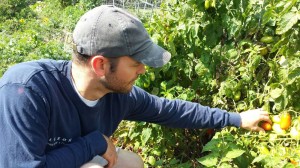
Charles Ikenberry, agricultural engineering Ph.D. student, studies watershed modeling
“Over the river and through the woods…” is a popular holiday song, but water and the outdoors describe Charles Ikenberry’s interests since a young age; he is still working in this industry as he gets a Ph.D. in agricultural engineering while working at the Iowa Department of Natural Resources (DNR).
These interests were further developed as Ikenberry attended the University of Nebraska at Lincoln for an undergraduate degree in civil engineering. He later received his master’s degree in agricultural and biological engineering from Kansas State.
Ikenberry now attends Iowa State and decided to pursue a Ph.D. degree after being presented with a prospect he could not refuse. “It was a good opportunity to dig a little deeper into the world of watershed modeling, which is one of my primary interests.”
Within watershed modeling, Ikenberry studies how water and nutrients move through tile-drained landscapes, which are common throughout north-central Iowa. Although several models exist for predicting water’s movement through tile drains at small field scales, Ikenberry’s research goal is to improve models for areas bigger than fields and farms. Creating large-scale models will improve the success rate of predicting how water and nutrients move in this environment, and how to develop effecting water quality improvement strategies.
Ikenberry is also applying his knowledge to real-world situations at the DNR, where he develops nutrient budgets for lakes and streams. During this process, he determines how much of a given pollutant a body of water can absorb, while still meeting its intended uses.
Although determining the budget can be challenging, answering the questions as they occur is Ikenberry’s favorite part of his career. “There are always more questions that need answers, and while that can be frustrating, it’s an endless opportunity to increase my knowledge.”
In the future, Ikenberry hopes to work more directly with farmers, “I’d really like to be able to help them develop soil and water conservation practices that are beneficial to them and the environment.” He also is interested in developing on-farm research and teaching.
Ikenberry’s spends his time away from work with his wife, Kristen, and four kids – James, Walter, Joseph and Eve. The Ikenberrys enjoy working in their large garden and raising small animals on their homestead. “It’s good to get your hands dirty if you’re going to be working with the science and policy of soil and water so you do not lose touch with the reality of the medium that you’re dealing with.”
